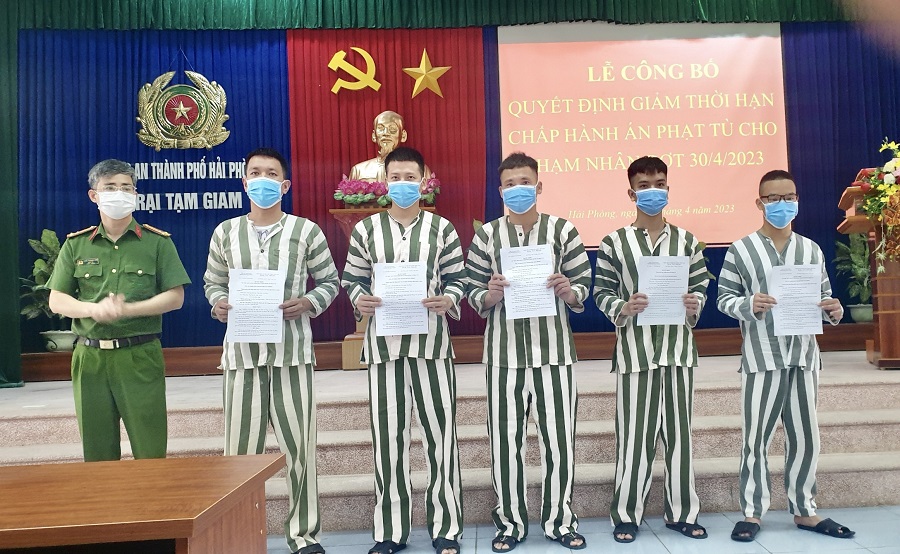Regime for medical care for inmates in Vietnam from November 15, 2024
The article below will provide the content of regime for medical care for inmates in Vietnam from November 15, 2024

Regime for medical care for inmates in Vietnam from November 15, 2024 (Internet image)
On September 30, 2024, the Government of Vietnam promulgated Decree 118/2024/ND-CP guiding the Law on Execution of Criminal Judgments 2019.
Regime for medical care for inmates in Vietnam from November 15, 2024
According to Article 9 of Decree 118/2024/ND-CP regarding regime for medical care for inmates in Vietnam:
- When inmates arrive at the detention facility, the facility's medical staff organize health examinations and create health check records. During the imprisonment period, based on the prisoner's conditions, duration of imprisonment, and specific circumstances, the detention facility collaborates with basic or specialized medical facilities or nearby military hospitals to organize periodic health examinations at least once every two years. These examinations include measuring height, weight, chest circumference, checking heart rate, blood pressure, body temperature, comprehensive clinical examinations, and para-clinical tests as prescribed by doctors. The results are recorded in the prisoner's file for health monitoring. The cost for periodic health examinations for inmates is covered according to the price framework set by the Ministry of Health. The detention facility also regularly implements measures for disease prevention, food safety, natural disaster preparedness, and accident prevention.
- Upon arrival at the detention facility, if inmates are sick or injured, they receive medical examination and treatment at the facility’s health center. If a prisoner has a serious illness or injury beyond the treatment capacity, the Head of the detention facility decides on moving the prisoner to a suitable medical facility for treatment and informs their family or legal representatives for cooperative care. If further specialized treatment is required, a decision is made by the Head of the detention facility after consulting with the health center to continue treatment and report to the relevant Criminal Judgment Execution Management Agency.
- Medical facilities near detention sites are required to allocate land within hospital premises to construct separate treatment areas for inmates. If there is no available land, at least three separate rooms within the facility should be designated for prisoner treatment, ensuring security and order. These facilities must arrange medical staff for the examination and treatment of patients per regulations. In military hospitals, dedicated patient rooms for inmates can be used for other patients when not occupied by inmates. Before planning new hospital construction, detention facilities must be notified to coordinate land allocation and design planning.
- The medication cost for ordinary illnesses for inmates is equivalent to 3 kg of rice per prisoner per month.
- For inmates showing signs of mental illness or other conditions affecting cognitive or behavioral control, while awaiting a forensic psychiatric assessment by the Provincial People's Court or Military Zone Court where the prisoner serves their sentence, the Head of the detention facility coordinates with state mental health facilities or hospitals at the military zone level to organize examination and treatment as per legal regulations.
- For inmates with a history of drug addiction, the detention center implements health care and rehabilitation programs. If a prisoner tests positive for drugs or stimulants, appropriate detoxification programs are coordinated with related agencies.
- inmates with HIV/AIDS, tuberculosis, other infectious diseases, and chronic conditions receive care and treatment according to current legal regulations.
More details can be found in Decree 118/2024/ND-CP which comes into force in Vietnam from November 15, 2024.
- Key word:
- medical care
- Vietnam
- inmates
- Number of deputy directors of departments in Vietnam in accordance with Decree 45/2025/ND-CP
- Cases ineligible for pardon in Vietnam in 2025
- Decree 50/2025 amending Decree 151/2017 on the management of public assets in Vietnam
- Circular 07/2025 amending Circular 02/2022 on the Law on Environmental Protection in Vietnam
- Adjustment to the organizational structure of the Ministry of Health of Vietnam: Certain agencies are no longer listed in the organizational structure
- Vietnam aims to welcome 22-23 million international tourists in Vietnam in 2025
-

- Number of deputy directors of departments in Vietnam ...
- 15:04, 05/03/2025
-

- Cases ineligible for pardon in Vietnam in 2025
- 14:43, 05/03/2025
-

- Decree 50/2025 amending Decree 151/2017 on the ...
- 12:00, 05/03/2025
-

- Circular 07/2025 amending Circular 02/2022 on ...
- 11:30, 05/03/2025
-

- Adjustment to the organizational structure of ...
- 10:34, 05/03/2025
-

- Notable new policies of Vietnam effective as of ...
- 16:26, 11/04/2025
-
.Medium.png)
- Notable documents of Vietnam in the previous week ...
- 16:21, 11/04/2025
-
.Medium.png)
- Notable documents of Vietnam in the previous week ...
- 16:11, 02/04/2025
-
.Medium.png)
- Notable new policies of Vietnam to be effective ...
- 16:04, 02/04/2025
-
.Medium.png)
- Notable new policies of Vietnam effective from ...
- 14:51, 21/03/2025

 Article table of contents
Article table of contents
